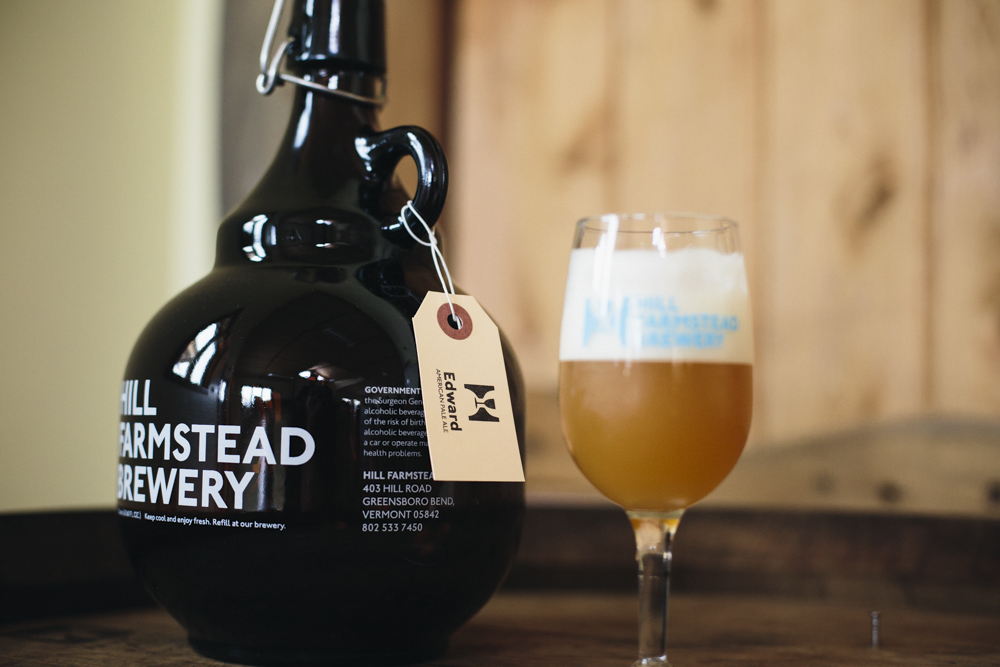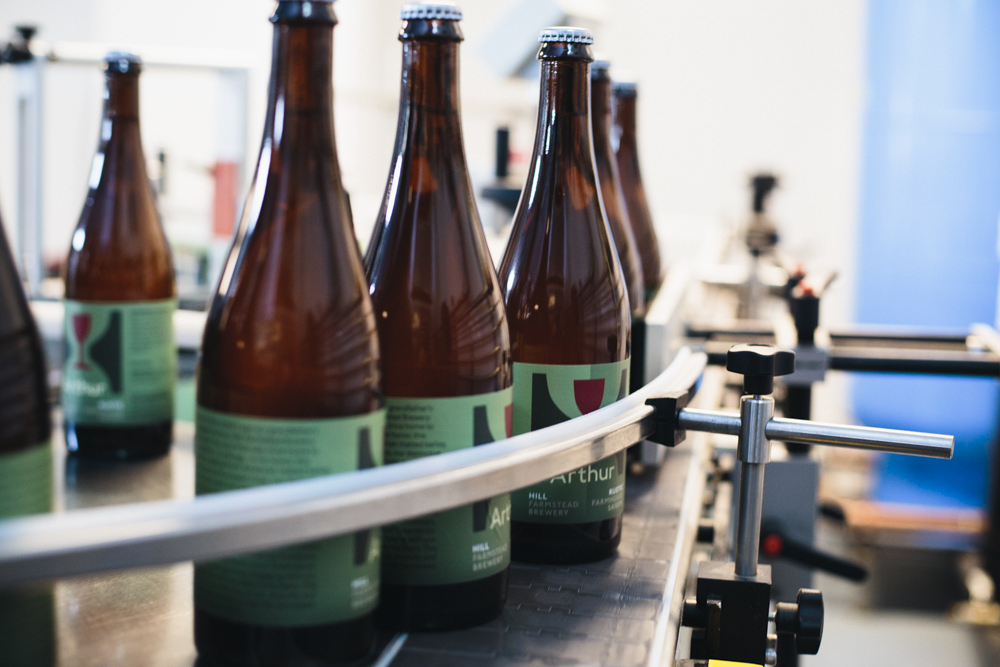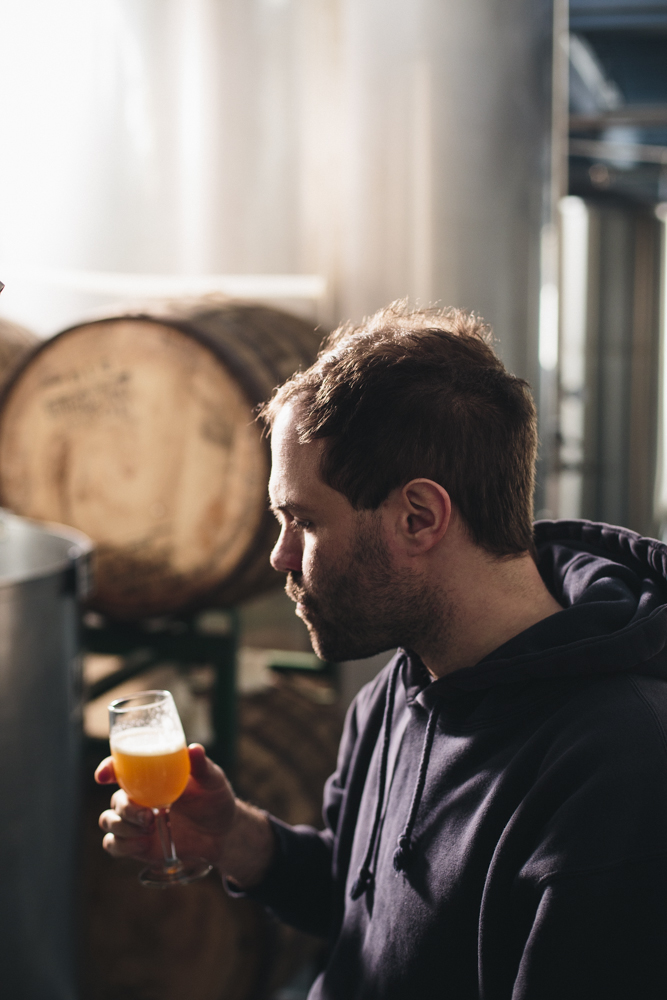The Wit and Wisdom of Shaun Hill

All photos by Pat Piasecki
Hermit. Perfectionist. Curmudgeon. Genius. Hill Farmstead’s Shaun Hill has been called many things, none more important than the founder and owner of the “Best Brewery in the World.” Despite products that far exceed the price of your everyday pint and his farmhouse brewery’s off-the-grid geography, Hill continues to garner more and more attention, including top billing in Boston‘s April issue. There’s so much thought and training that goes into making Hill Farmstead’s saisons and stouts, which is why it continues to challenge palates and inspire new ways of looking at the category.
After spending several hours with Hill, it became apparent to me (as it would anyone) that he’s a wellspring of information, not just on beer and the brewing industry, but philosophy, poetry, and the human condition. Yes, he’s introspective and moody. But he can also be warm, witty, and really damn funny. That’s why we’ve mined some more stray nuggets of wisdom that weren’t able to fit in the feature, including his thoughts on the ballooning craft beer industry, plagiarism, and his constant struggle to be a better person.
On watching admiring sycophants wait for hours for your beer…from your bedroom window:
“Now it seems a little more commonplace. I’m beginning to relax and accept it. Now I’d say that it’s weird to me now if there isn’t people out there because then it makes me feel like I’m doing something wrong. If there’s an off day in retail amidst all this build-out, when you’ve invested all this money, it can be a little sobering.”
Pressure? What pressure?
“All pressure is only ever self-inflected. Pressure isn’t a real thing. But if you look at the nature of psychosis and someone who strives for perfectionism, or achieving a certain goal, where do all those things come from? I don’t know. It’s a challenge to always be better in all ways: being a better person, being nicer to people, making better beer, being a better listener, being more patient and understanding, being more sympathetic, being more empathetic. These are daily pursuits.”
How his finest beers may have ended up in the garbage:
“If you taste a barrel and you don’t taste it again for six months, you might have missed its peak. And you can never know where that peak is. Usually it’s just like, ‘This is so good, we have to package it now.’ It could get better, but it could get worse. I’ve dumped barrels over the last year or two because I was so busy and tied up that when I went back to that barrel a month later to package it, I missed its arc. That’s really sad because when you think about it, people who really appreciate the complexities and the finesse in our beer, I just deprived them of the opportunity to taste something they might have never tasted before. If what we’re doing is taste experimentation and evolving the palate, at least for myself, even in my own conception of what I’m doing, I feel sad knowing that I wasted that product—all that yeast, malt, hops, and water.”

Photo by Pat Piasecki
What, you want a refund?
“How long does a brewer remain responsible for their product once it leaves here? If you go home and put one of our beers in your cellar for two years and then you open it and say it tasted sour or bad, I’m going to say, ‘Yeah, no kidding!’ But along those same lines, I just opened a 1976 Dom Perignon a week ago and the cork had fallen apart and the wine was oxidized. You think I called Dom Perignon and told them that their 38-year-old bottle of Champagne was no good? When I was at Dom Perignon in April, I went to dinner with the chef de cave [Richard Geoffroy] and we also did a sampling of champagne. Three out of the 20 bottles that we opened were corked. Granted, some of these were going back to 1969, but I asked him, ‘What are the odds of that happening?’ and he said ‘Actually, quite slim. Usually, it’s not that high, but it happens.’”
Beer as online currency—and the bastards who participate in it.
“Imagine we have a 300 bottle release and 25 percent of the people, those standing somewhere in the middle of the line, are just buying that beer to sell it and never even consume it. And the people in the back of the line get to the front and the beer’s gone and those people were actually going to drink it and made the effort to drive all the way out here. There’s this whole argument amidst capitalist America, which is ‘Hey man, I’ve given you my money I can do whatever I want. I can sell it out and never drink it. I can destroy it. I can do whatever I want.’ Everyone in America is like ‘Capitalism! Hail capitalism!’ Nothing gets in the way of the dollar in capitalism. Whatever happened to idealist principles like integrity and respect, thoughtfulness, and maybe not trying to destroy ourselves as a civilization? Where did those ideals go?”

Photo by Pat Piasecki
No, that coffee milk stout fermenting in your garage doesn’t mean you’re qualified to run a professional brewery.
“I think it [the booming craft beer industry] is oversaturated with bad beer and people who should have paid their dues before opening a brewery. To be a plumber, you have to pass a test. To be an electrician you have to do five years, or whatever, of being a journeyman.”
Excuse me! Who the hell are you and why are stealing my shit?
“The only real hang-up I think, the part that truly annoys me, is when someone just wants to pass ‘Go,’ to use a Monopoly analogy. They want to collect $200 without putting in anything. The thing is now—with this modern light-speed dissemination of information with the Internet—is that nobody wants to just learn something for themselves. They want you to tell them. ‘What’s going to happen if I do this, this, and this?’ My response is always, ‘I don’t know. Let me know.’ The only time I really discuss that stuff is with friends like Chad Yacobson from Crooked Stave, Gabe Fletcher at Anchorage, or John Kimmich. Friends. We’re working off each other. It’s a give and take. It’s not just a take. If you have something to give me, yeah, I’ll share with you. I’m not mining them for information to plagiarize what they’re doing. And likewise it’s not the other way around. We’ll learn something and develop something new out of it. That’s dialogue and growth.”
Yes, even Budweiser has flavor. You’re just not looking for it.
“In my humble opinion, perhaps the world of beer would be a much happier world if people appreciated subtlety and nuance. Instead, as long as imperial stouts and double IPAs are the two highest rated categories of beer…why is that? It’s because there’s so much flavor. It’s so intense, how could it not hit everything. But drinking a perfectly refined, absolutely flawless pilsner, where the water is perfectly minerally, the hop aroma is just absolutely dialed-in, and the flavor is crisp and leaves you with a pleasant aftertaste with just a kiss of hops. That’s a difficult to make and produce on a regular basis. There’s no room to hide anything. People need to herald those efforts. I think it says something about the craft beer consumer. It was a reaction to Budweiser. ‘Those are beers are tasteless and they’re light.’ Well actually, there is taste. There is flavor. You’re not looking for it, you’re just being antagonistic. We’re trained to think something that’s lower in alcohol is just fizzy yellow water.”

Photo by Pat Piasecki
Still pissed about that Super Bowl ad? Well, guess what? Craft breweries also have a penchant for propaganda.
“There’s a brewery that told consumers that if they can’t handle the bitterness and aggressiveness of their beers that they’re ‘not worthy.’ And ‘fizzy, yellow beer is for wimps.’ It’s a really incredible psychological campaign, isn’t it? You’re supposed to like this because it’s intense. You’re not man enough and there’s something wrong with you if you don’t like it.”
On building a legacy:
“That’s still mind-blowing to me. You work for so hard and so long to make your dream a reality, and it takes you aback when you start to realize at some point, ‘Shit, it’s not really about me anymore.’ Once you hit the ‘Go’ button and you start moving, and you’re a business, it just takes on a life of its own. But yeah, we’ve definitely influenced Vermont beer.”


